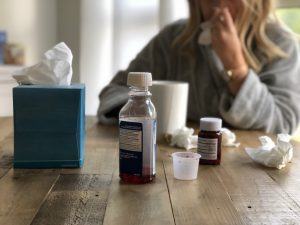BY LAURA-LEE CASCAGNETTE
As temperatures drop, colds and flus begin to rise and students should be extra vigilant in the fight against germs.
The warnings your mother gave you about leaving the house with wet hair or staying out in the cold for too long are actually not the reasons you may be catching the bug that’s going around.
Megan Jarchow, a Ontario registered nurse now living in British Columbia says that bacteria is spread from more people spending time indoors.
“People get sick when their immune system is exposed to a bacteria or virus. Bacteria and viruses are most commonly spread through direct and indirect contact with another person. Winter is a colder season that drives many indoors where microorganisms causing sickness are more easily spread. Sneezing and coughing also introduce particles into the stagnant indoor environment.”

If left untreated, many colds and flus have the potential to worsen, weakening your immune system and sticking with you for the duration of the season. Some of the common illnesses include influenza A, influenza B, respiratory syncytial virus (RSV), bronchiolitis, pneumonia and strep throat. Sounds like a great way to spend the holidays, right? Wrong!
“A common misconception is that all sickness can be treated with antibiotics. Most winter illnesses are the result of viruses and therefore cannot be treated with antibiotics but must run their course,” says Jarchow. This is a important tip for students in taking health seriously during the winter months. Getting sick not only affects having fun, it affects your ability to attend school and keep up with your studies.
Sickness may seem impending, taking out students one by one, but there are ways to prepare yourself and keep a cold at bay. As a kindergarten teacher in Orangeville, it is imperative that Rachel Berenguer stays healthy during the school year. “I drink litres of water, and take echinacea morning and night,” she says. “Also if I feel a cold coming, I do wet sock therapy! Wet cotton socks, put dry wool socks over top, and go to bed. Wake up in the morning with dry cozy feet and no more stuffiness.”
It is important to practice good hand hygiene, avoid sick contacts, get the flu shot and maintain a healthy lifestyle to support your immune system. This includes getting enough sleep, keeping hydrated with water, eating a healthy diet and exercising appropriately. “A helpful tidbit is to also take vitamin D drops daily for those living in climates with fewer hours of sun during the winter months,” Jarchow says.
Be proactive and head to the Sheridan Health Services for your flu shot. The shots are available the third week of October for students entering into placements of high risk. For the general student body, flu shots will be available in November.
